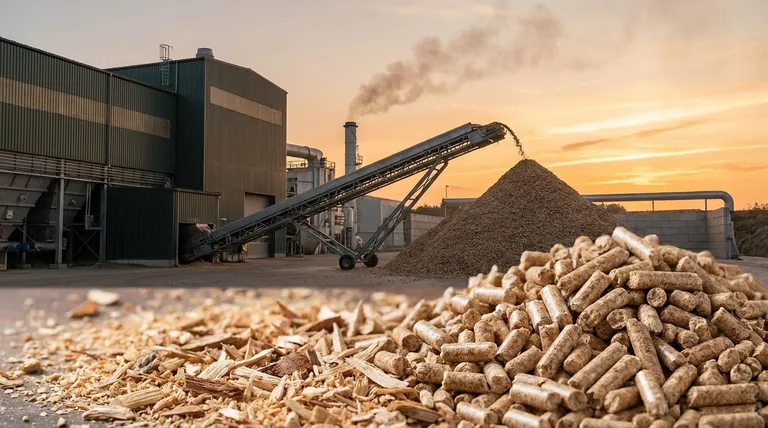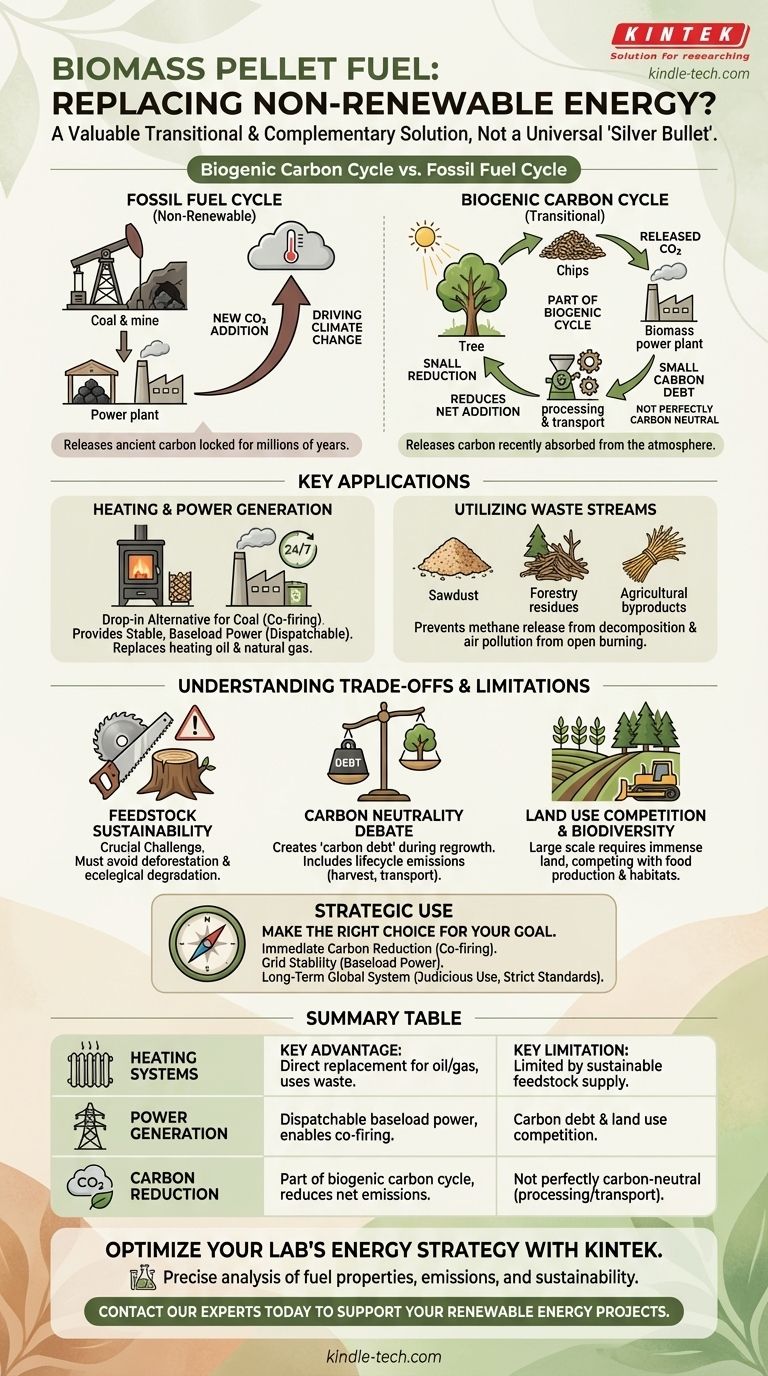In certain applications, yes. Biomass pellet fuel can and does directly replace non-renewable energy sources like coal and heating oil today. However, viewing it as a universal, one-to-one substitute for the entire global fossil fuel infrastructure is not feasible due to critical limitations in scalability and sustainability.
Biomass pellets are best understood as a valuable transitional and complementary fuel, not a silver bullet replacement for all non-renewable energy. Their greatest strength lies in decarbonizing specific sectors where other renewables fall short, but their potential is ultimately capped by the sustainable supply of raw materials.

How Biomass Pellets Function as an Energy Source
To understand the potential of biomass, we must first clarify what it is and how it fits into the energy landscape. It is not a new technology, but a refinement of humanity's oldest energy source.
From Organic Matter to Standardized Fuel
Biomass pellets are a densified, standardized form of solid biofuel. They are typically produced from compressed organic materials like wood waste (sawdust, forestry residues), agricultural byproducts (straw, corn stover), or dedicated energy crops.
This process transforms low-density, irregular raw materials into a uniform, low-moisture fuel with predictable energy content, making it easy to transport, store, and use in automated systems.
The Carbon Cycle Advantage
When biomass pellets are burned, they release carbon dioxide (CO2). However, this CO2 is part of the biogenic carbon cycle. It is the same carbon that the source plant absorbed from the atmosphere during its growth.
This is fundamentally different from fossil fuels, which release ancient carbon that has been locked away for millions of years, adding new CO2 to the atmosphere and driving climate change. While not perfectly "carbon neutral" due to processing and transport emissions, biomass energy significantly reduces the net addition of new carbon.
Key Applications: Heat and Power
Biomass pellets are primarily used for two purposes:
- Heating: In residential pellet stoves or larger commercial and institutional boilers, replacing heating oil or natural gas.
- Power Generation: Burned in dedicated biomass power plants or, more commonly, co-fired alongside coal in existing power stations to generate electricity.
The Case for Biomass as a Replacement
The ability of biomass to substitute for fossil fuels is most compelling in applications that require a solid, combustible fuel source for consistent power.
A Drop-In Alternative for Coal
One of the most significant advantages of biomass pellets is their ability to be co-fired in existing coal power plants. The similar physical properties allow plants to substitute a percentage of coal with pellets with minimal and cost-effective modifications.
This provides an immediate pathway to reduce a power plant's carbon footprint without decommissioning the asset, acting as a crucial bridging technology.
Providing Stable, Baseload Power
Unlike intermittent renewables like wind and solar, biomass power is dispatchable. A biomass plant can generate electricity 24/7, providing the reliable baseload power that is essential for grid stability.
This makes it a direct replacement for the role that coal and natural gas plants currently play in ensuring a constant supply of electricity, helping to balance the grid as more intermittent sources are added.
Utilizing Waste Streams
A key benefit of the biomass industry is its potential to create value from materials that would otherwise be considered waste. Using sawmill residues or agricultural byproducts prevents them from decomposing and releasing methane (a potent greenhouse gas) or being burned in the open, which causes air pollution.
Understanding the Trade-offs and Limitations
The potential of biomass is constrained by very real and significant challenges. An objective assessment requires a clear understanding of these limitations, which prevent it from being a total replacement for fossil fuels.
The Critical Question of Feedstock Sustainability
The single greatest challenge is ensuring the sustainability of the raw material. If demand for pellets leads to deforestation or the degradation of natural ecosystems, any climate benefits are quickly erased.
True sustainability requires using only genuine residues and waste, or wood from verifiably well-managed forests where the rate of growth exceeds the rate of harvest. As demand grows, ensuring this standard becomes increasingly difficult.
The Carbon Neutrality Debate
The "carbon neutral" claim is an oversimplification. A "carbon debt" is created when a tree is harvested and burned; it takes years or decades for a new tree to grow and re-absorb that same amount of carbon. During this period, the atmospheric CO2 concentration is higher than it would have been.
Furthermore, emissions from harvesting, processing, and long-distance transportation (e.g., shipping pellets from North America to Europe) must be accounted for in the total lifecycle emissions.
Land Use Competition and Biodiversity
Scaling biomass production to a level that could replace a significant fraction of global fossil fuel use would require immense amounts of land. This would inevitably lead to competition with land needed for food production and the preservation of natural habitats for biodiversity.
The large-scale cultivation of monoculture energy crops presents its own set of ecological risks, including soil depletion and water use.
Making the Right Choice for Your Goal
Biomass pellets are a specialized tool, not a universal solution. Their value depends entirely on the specific energy goal you are trying to achieve.
- If your primary focus is immediate carbon reduction in the power sector: Co-firing biomass in existing coal plants is a proven, effective, and relatively low-cost strategy to lower emissions quickly.
- If your primary focus is grid stability in a high-renewables future: Biomass offers a crucial source of dispatchable, baseload power that can balance the intermittency of wind and solar.
- If your primary focus is a fully sustainable, long-term global energy system: Biomass must be used judiciously, with strict sustainability sourcing standards, as one component within a diversified portfolio that includes solar, wind, geothermal, and energy efficiency measures.
Biomass pellets can replace non-renewable energy in key strategic areas, but they are a piece of a complex energy puzzle, not the entire solution.
Summary Table:
| Application | Key Advantage | Key Limitation |
|---|---|---|
| Heating Systems | Direct replacement for oil/gas; uses waste streams | Limited by sustainable feedstock supply |
| Power Generation | Dispatchable baseload power; enables coal co-firing | Carbon debt & land use competition |
| Carbon Reduction | Part of biogenic carbon cycle; reduces net emissions | Not perfectly carbon-neutral due to processing/transport |
Optimize your lab's energy strategy with the right equipment.
Biomass pellet research requires precise analysis of fuel properties, emissions, and sustainability. KINTEK specializes in lab equipment and consumables for energy research, providing reliable tools for analyzing biomass composition, combustion efficiency, and environmental impact.
Whether you're developing next-generation biofuels or evaluating sustainable energy sources, our solutions help you generate accurate, reproducible data to inform critical decisions.
Contact our experts today to discuss how KINTEK can support your laboratory's renewable energy projects with tailored equipment and consumables.
Visual Guide

Related Products
- Customizable PEM Electrolysis Cells for Diverse Research Applications
- High Purity Zinc Foil for Battery Lab Applications
- Custom PTFE Teflon Parts Manufacturer for Centrifuge Tubes
- Laboratory Muffle Oven Furnace Bottom Lifting Muffle Furnace
- Aluminum Foil Current Collector for Lithium Battery
People Also Ask
- What is an electrolysis cell also known as? Understanding Electrolytic vs. Galvanic Cells
- How do specialized electrolytic cells facilitate electrochemical testing? Enhance Stainless Steel Corrosion Analysis
- What is a proton exchange membrane? The Selective Heart of Hydrogen Energy Systems
- What structural advantages do PEM electrolyzers offer? Compact, High-Density Hydrogen Production Solutions
- What are the correct procedures to follow after using the electrolytic cell? Ensure Safety and Equipment Longevity











